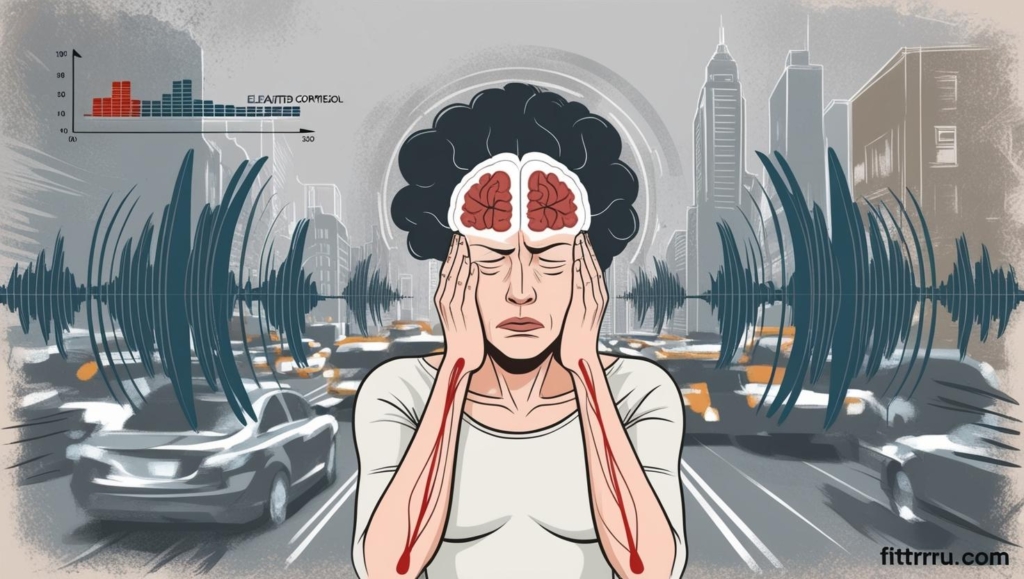We worry about sugar, sleep, and screen time.
But what if one of the most overlooked threats to your health…
…is sound?
Not loud explosions.
Not rock concerts.
But chronic, low-grade noise—the kind that fades into the background…
…and slowly wears you down.
Welcome to the world of noise pollution—
The silent stressor modern life forgot to mention.
🎧 What Is Chronic Noise?
It’s not always obvious.
It’s the hum of traffic outside your window.
The AC unit that never stops.
Construction clatter. Airplanes overhead.
Even your neighbor’s TV.
Chronic noise doesn’t scream.
It lingers.
And that constant exposure?
Your body registers it—even if your brain learns to tune it out.
🧠 Your Body Thinks It’s Under Attack

Here’s the kicker:
Your nervous system can’t tell the difference between real danger…
…and background noise.
So when your environment is constantly buzzing,
Your brain stays stuck in fight-or-flight mode.
Adrenaline spikes.
Cortisol—the stress hormone—rises.
Your heart rate increases.
And over time, this leads to wear and tear on nearly every system in your body.
💥 The Health Impacts Are Real

You might not “hear” the damage—
But your health does.
Here’s what chronic noise can lead to:
1. Heart Problems
Studies show people living near airports or highways have higher rates of:
- High blood pressure
- Irregular heartbeat
- Even heart attacks
Why?
Because constant stress on your cardiovascular system leads to inflammation and arterial damage.
2. Sleep Disruption
Even mild noise can interrupt sleep cycles—
And deep sleep is where your body repairs, resets, and restores.
Without it, you wake up tired, moody, foggy.
And long term? Poor sleep is tied to:
- Obesity
- Diabetes
- Depression
- Weakened immunity
3. Mental Health Strain
You might not realize it, but noise fatigue is real.
It makes you:
- More irritable
- More anxious
- Less focused
Your brain is constantly processing sound—even when you’re “resting.”
And that mental drain lowers cognitive performance and emotional stability.
🔇 But I’m Used to It — Isn’t That Enough?
Here’s the tricky part:
Adaptation doesn’t mean immunity.
You can get used to chronic noise…
…but your body doesn’t.
Even if you’re not consciously stressed,
Your nervous system is still under pressure.
It’s like holding a glass of water.
Easy at first.
But hold it for hours—and your arm shakes.
That’s what chronic noise does to your health.
🛠️ What Can You Do About It?

You don’t need to move to the mountains.
But you do need to be intentional.
✅ 1. Create a Quiet Zone at Home
- Use noise-cancelling curtains
- Add soft textures: rugs, cushions, wall hangings
- Place bookshelves along walls to absorb sound
✅ 2. Use White Noise Strategically
Ironically, soft white noise can block out disruptive sounds.
Try:
- Fans
- Rainfall sounds
- Ocean waves
It’s not about silence.
It’s about controlled sound.
✅ 3. Set “Noise Breaks” During the Day
Give your ears—and brain—a break.
Even 10 minutes of silence lowers cortisol and boosts calm.
You can:
- Sit in a quiet room
- Meditate
- Use earplugs during commutes
✅ 4. Turn Down the Volume of Your Life
Not just devices.
But the pace you operate at.
Because sometimes, noise is a symptom of inner chaos.
Slowing down can turn the volume down—inside and out.
🌿 Your Nervous System Needs Peace, Too

We often talk about clean eating, good sleep, and movement.
But the healthiest version of you also lives in a quiet(er) environment.
In a world that’s always louder,
Silence is a health habit.
And protecting your peace?
It’s just as powerful as hitting the gym.
🧠 Final Thought
Noise may be invisible.
But its effects are not.
If your stress feels “mysterious,”
If you’re always tired or tense…
Check your soundscape.
It might be time to reclaim the calm your body has been craving all along.
🔔 Follow Fittrru.com for More Science-Backed Wellness Truths —
Because real health goes beyond workouts and salads.






